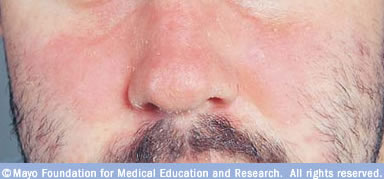Natural Remedies for Dermatitis on Face
Dermatitis is a medical term (general term) used to describe a skin inflammation. It can occur in many forms and also can be triggered by lots of causes. But in general, typically it causes itchy rash on reddened, swollen skin. It can affect many parts of the body, including face. And since face is so sensitive, many people are more likely to use natural remedies to help relieve and improve the problem.
Dermatitis is not contagious and not life-threatening condition, and in fact it is a common skin problem. However, it can lead to low self –esteem and can be embarrassing, particularly if it affect the visible sites of the body such as face.
As mentioned before, it can come with many forms and causes. Some examples of common dermatitis are dandruff, rashes, and atopic dermatitis (the most common type of eczema).
 The cause of the problem can determine the type of dermatitis. A number of medical health problems, irritants, genetic factors, allergies, or even maybe some lifestyle factors can trigger to cause different forms of dermatitis.
The cause of the problem can determine the type of dermatitis. A number of medical health problems, irritants, genetic factors, allergies, or even maybe some lifestyle factors can trigger to cause different forms of dermatitis.
- Seborrheic dermatitis. It is a kind of eczema that usually affects the greasy and hairy skin such as scalp and middle of chest. It can be chronic that may come & go. Some experts believe that genetic may play a key role. Visit this section for in-depth information about seborrheic dermatitis.
- Atopic dermatitis. This type of eczema often affect individuals with a family history of eczema, asthma, or/and hay fever. This suggests that this chronic skin problem may run in families. Furthermore, many times it comes with allergies.
- Contact dermatitis. As the name implies, this skin problem can occur due to a direct contact with an allergen /irritant. These allergens can vary from person to person. In general, certain cosmetics, cleaning products, nickel-jewelry, and poison ivy can be a potent irritant in many cases of contact dermatitis.
The appearance of the affected skin can be used to help diagnose the kind of dermatitis that you are experiencing. The diagnosis should not be made on your own – see a dermatologist /doctor to get a clearly diagnosis!
Seborrheic, atopic, and contact dermatitis are the most common types of dermatitis. Each type may look with a slightly different. And each type is more likely to affect certain parts of the body.
In general, there is no specific test to make a diagnosis, except maybe for allergic contact dermatitis. A professional dermatologist with his /her experience is well-trained to deal with this issue.
The following is an example picture for seborrheic dermatitis on face (credit to Mayo Clinic):
Since the treatment plan is based on the particular type of dermatitis that you have, it’ important to find out an accurate diagnosis. Each type can be treated with different treatment approaches – though generally, there are also some medications that can be used for all types of skin problems.
Furthermore, more than one form /type of dermatitis can be present at the same time in some cases. This is usually found in severe cases, the advice of a doctor /dermatologist is usually needed.
The conventional treatment options for dermatitis can vary, depending on the casus and may be where it occurs.
Since face is the crucial part of your skin, the treatment should be done carefully in order to reduce the risk of developing any scar after healing.
Avoiding irritants, applying wet compresses, or even using corticosteroids (in severe cases) are usually the core of the conventional treatment options for most cases of dermatitis. Sometime doctor may also recommend the use of light therapy with artificial /natural light to help improve the problem.
Along with the treatment plan prescribed /designed by your dermatologist /doctor, the following are some natural remedies that can help improve and relieve dermatitis on face:




